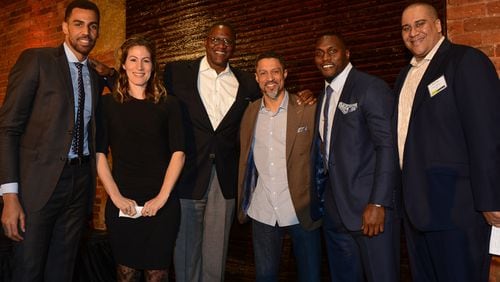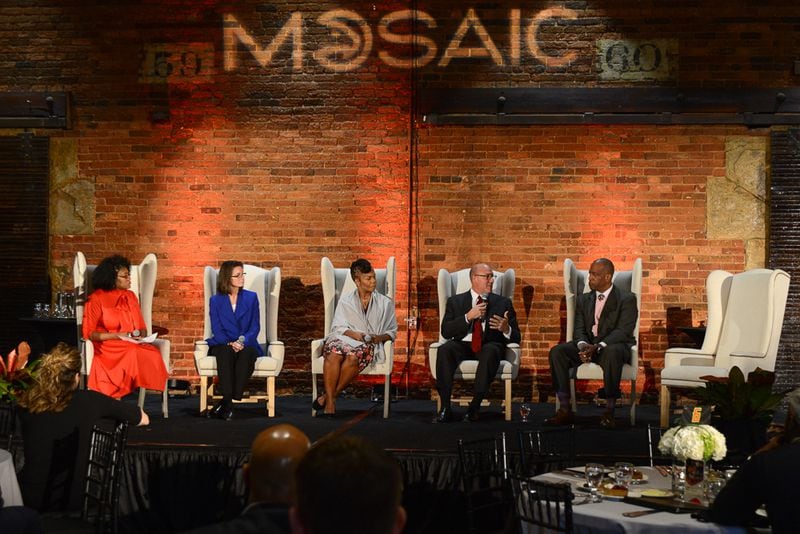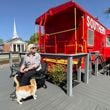Social activism and sports may seem like a peculiar combination. Many fans may argue that they like their sports to be free of politics. A form of escapism.
But athletes are human beings with political and social beliefs. Oftentimes, keeping the two separate is simply unrealistic.
Atlanta Hawks’ Chief Diversity & Inclusion Officer, Nzinga Shaw, believes when sports organizations ignore what’s going on in the world they run the risk of coming off as inauthentic.
As a result of this, she has used her position to put together the Model of Shaping Atlanta through Inclusive Conversations (or MOSAIC) symposium. Held at the Georgia Railroad Depot in downtown Atlanta on March 14, the event brought together about 300 influential Atlanta residents to network and listen to panelists speak on the role that sports leaders play in diversity in local communities. Last year the inaugural symposium was held at the National Center for Civil and Human Rights Museum.
Shaw said her main goal for this year was extending the conversation beyond race and gender. She did this by breaking the event into two main panels, with the segment before lunch tackling athletes and how they use their platforms to shed light on important social issues, and the one after lunch exploring how corporate executives and their organizations tackle diversity in an authentic manner.
Moderated by The Undefeated’s Marc Spears, the first panel featured Hawks legend Dominique Wilkins, former NFL player Takeo Spikes, former NBA player Mahmoud Abdul-Rauf, ESPN’s director of communication Keri Potts and Atlanta Hawks player Thabo Sefolosha.
Sefolosha briefly discussed his ongoing civil case against the NYPD and Wilkins talked about his role as an advocate for diabetes patients, but the highlights of the panel were certainly Abdul-Rauf and Potts.
Potts discussed her international fight to have the man who sexually assaulted her in Italy prosecuted. She credits sports, specifically her time playing volleyball, with giving her the strength to escape from her attacker and serve as an advocate for victims. She has written about the harrowing incident for a few publications, including Marie Claire and USA Today.
For his part in the panel, Mahmoud Abdul-Rauf, who changed his name from Chris Jackson after converting to Islam, talked about being “blackballed” from the NBA after refusing to stand during the national anthem more than twenty years ago.
He spoke on the differences between the society in which he protested and the social-media driven world in which Colin Kapernick recently protested. Abdul-Rauf said he believes social media amplifies the voices of everyday people, giving supporters and critics a way to share their thoughts with a mass audience.
Although their means and reasons for advocacy differed, all of the panelists agreed that they had a responsibility to use their platforms to champion social issues.
Credit: Jewel Wicker
Credit: Jewel Wicker
After lunch, the conversation changed from the role of athletes to how sports executives can effectively tackle diversity. Shaw moderated this panel.
National Hockey League’s vice president of human resources Keith Harris, Atlanta Falcons’ assistant general manager Scott Pioli, Atlanta Hawks’ chief marketing officer Melissa Proctor and Atlanta Dream’s president Theresa Wenzel participated in the segment.
“We just want to make it as normal as possible,” Pioli said when asked why the organiation didn’t emphasize the fact that Sowers is a woman in an effort to prove that diversity is a priority for the Falcons.
Pioli said Sowers is a part of creating a pipeline for more diversity in the organization. Both the team and Sowers have been keeping logs of unique obstacles that have come up since she was hired. It's their way of acknowledging current blind spots so that they can avoid them in future instances.
One potential obstacle was whether or not Sowers would be allowed in the locker room. Pioli said the players and the rest of the organization immediately welcomed her and made the necessary considerations to ensure she is comfortable.
Pioli believes executives are hired for their ability to think critically and solve problems. Finding solutions to obstacles that arise when being diverse and inclusive should be no different.
“That’s what leaders do,” he said.
CNN political commentator Bakari Sellers and Atlanta Hawks and Philips Arena CEO Steve Koonin also spoke during the event.
Shaw said she plans to continue to be inspired by current social issues when planning future MOSAIC symposiums.
About the Author







